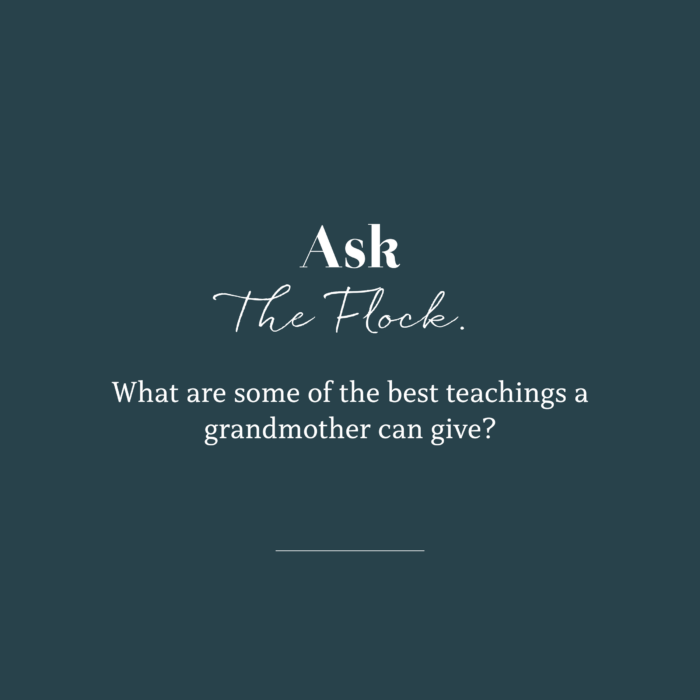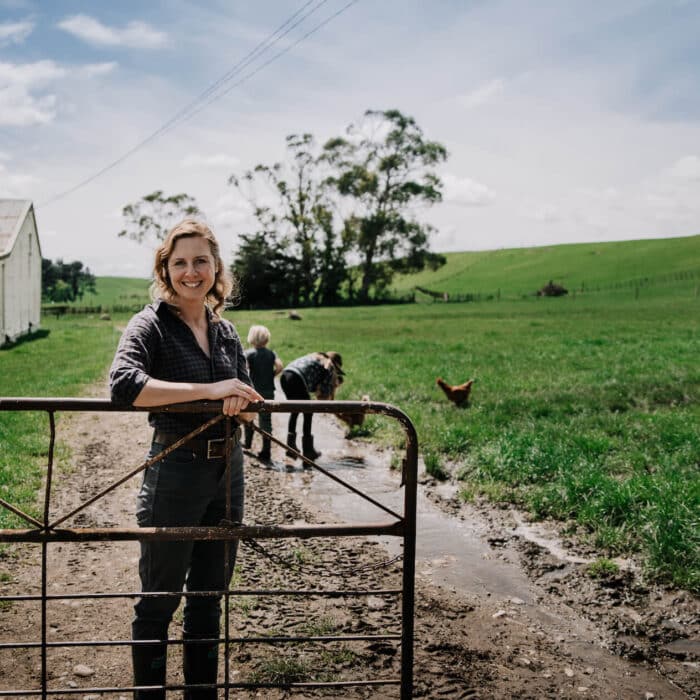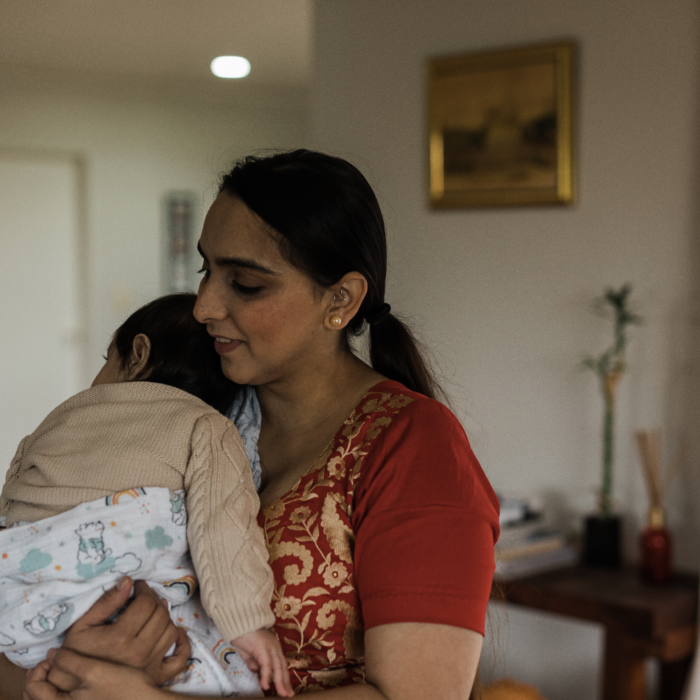22 January 2023
The challenges – and rewards – of running a business in the remote communities of Aotea Great Barrier
Ngā Hononga. Common Threads.
writer: SIONAINN MENTOR-KING
photographer: MICHELLE MARSHALL
Aotea Great Barrier Island is a place many Kiwis know as a summer paradise, a back-to-basics holiday island. But for Orla Cumisky, Felicitas Weisbach and Andi Ross, not only is Aotea their year-round abode, it’s also the location of their businesses. When seasonal storms rage across the island, these three women have to batten down the hatches and get on with business as best they can – off-grid, and often cut off from the mainland by severe weather. They talk to Shepherdess about the difficulties and delights of island life.
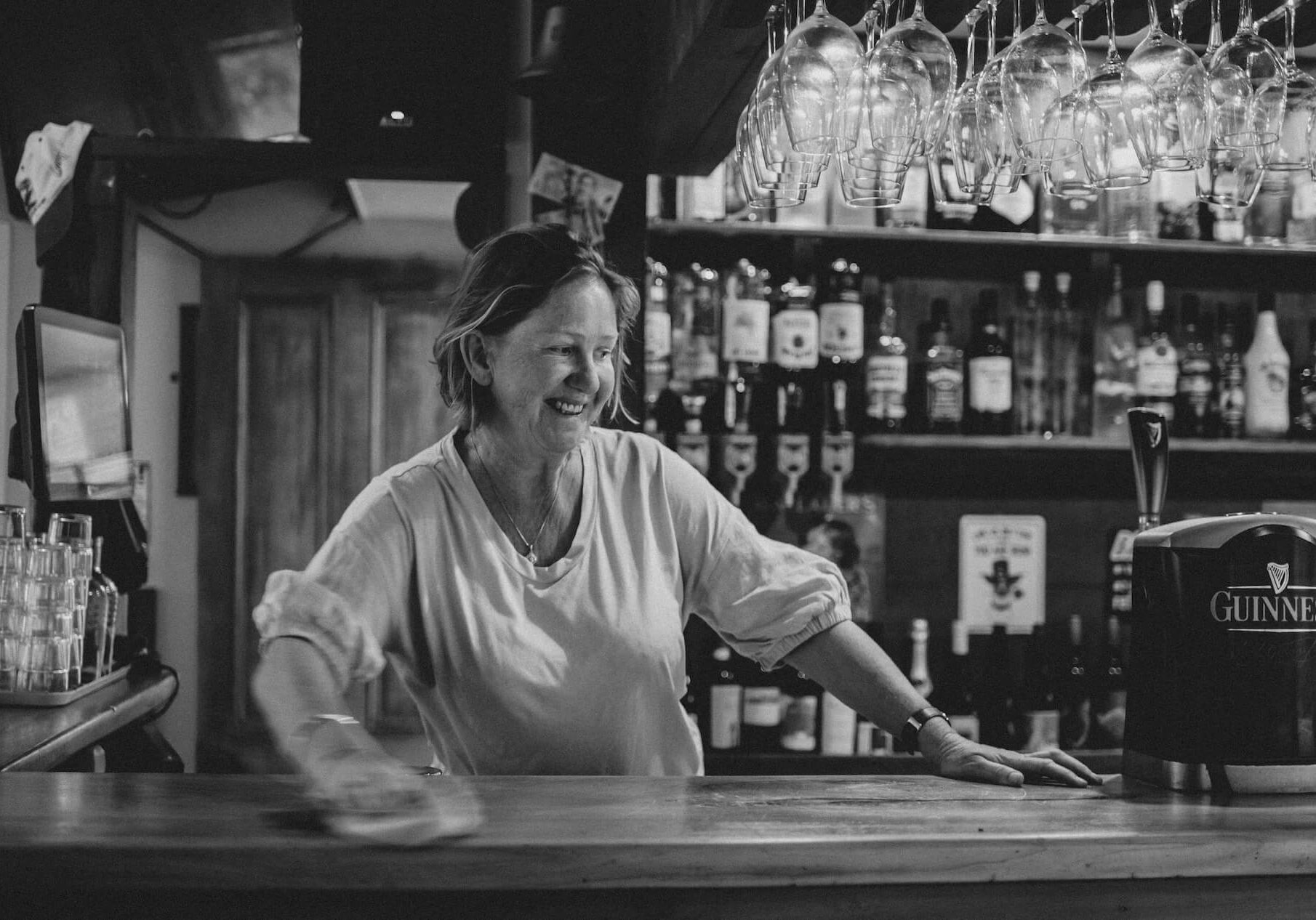
Orla Cumisky
At 10pm on a stormy Friday night, the lights at the Currach Irish Pub in Tryphena suddenly go out. After several days of wild weather on Aotea Great Barrier, the solar power has finally given up the ghost. A primal roar of excitement rises from the punters as they are plunged into inky darkness. Phone lights come on, and the evening proceeds by torchlight as they wait for the generator to be manually fired up.
Over lunch the next day, Orla Cumisky – the Currach’s owner-operator – explains the glitch that meant seven minutes of darkness the night before. “We had been on solar till that point,” she says – which is amazing, considering how bad the weather had been. “On Great Barrier, everybody wants to talk to you about their panels, but I have none! My power is supplied by my neighbour. He has installed a massive power system of a hundred and eighty or something solar panels to supply me and others with power. I buy my power from him, so it’s like a little micro-grid. He has invested a very substantial amount of money in putting in a power system to silence generators in this area, for everybody’s enjoyment. Can you hear the birds? That’s what you hear now.”
Last night’s exciting blackout was a bit unusual, Orla admits. “Usually, it’s an automated process. You’d just see a little zitt in the lights as it transfers over, but I think maybe because of the wind last night, the signal didn’t come so it just cut out. It just takes us a moment to go down and manually switch it over.”
It’s not the only damage the storm has done. Out the back of the pub, beyond the wide deck by the little creek that runs along the bottom of the property, the alarm on the septic tank is going off. It’s a polite but urgent noise, high pitched enough to almost blend with the calls of the tūī and kākā that have made their homes in the ancient spreading pōhutukawa that canopy the Currach and the pub’s accommodation, the Innkeeper’s Lodge. All the rain over the past two days has flooded the septic system, and though this is probably less dire than it sounds, it’s a problem that can’t be ignored. While his lunch – a delicious duck Caesar salad made by the pub’s chef – sits waiting on the table, Orla’s partner Mark is down the back making things water-tight.
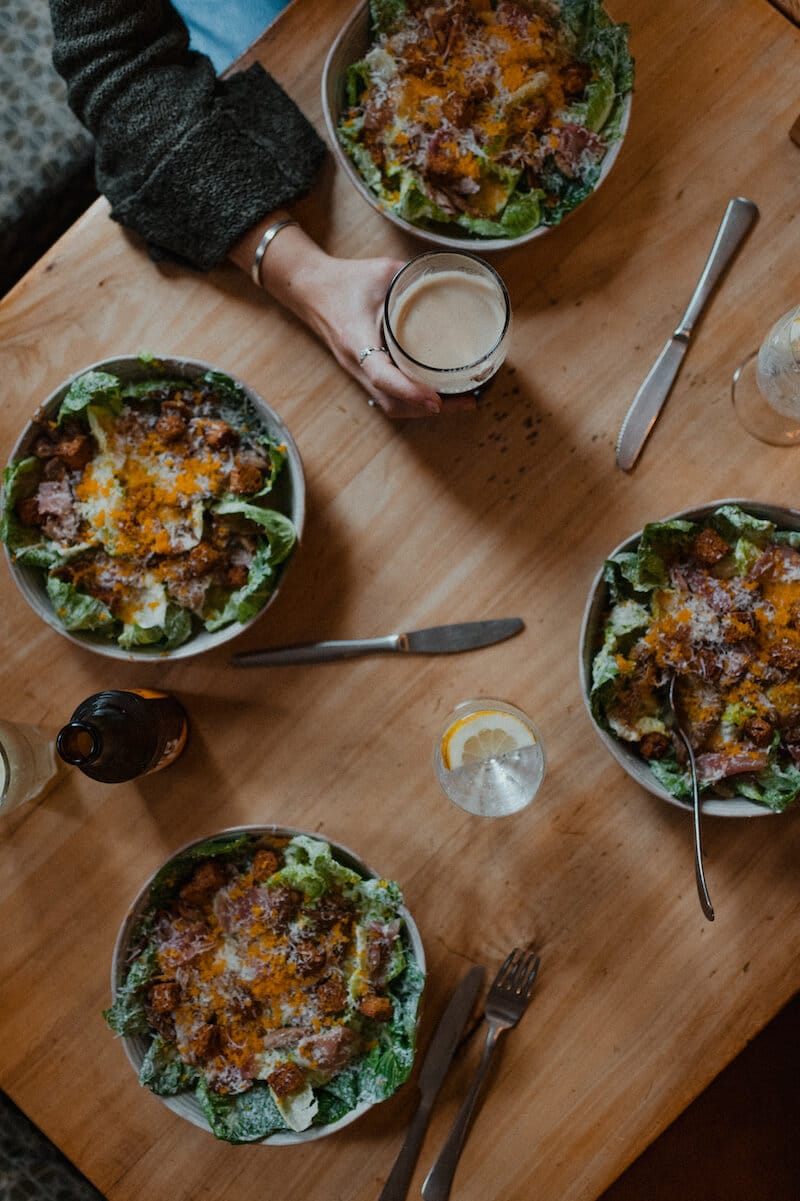
Since Orla and Mark purchased the Currach from founders Maire Burns and Phil Judd in 2020 they have done a lot to ensure that it can withstand both the storms of winter (and, apparently, early summer) and the summer season, when the population of the island explodes from a mere 1,040 residents to many times that.
“Easter holidays are really busy; school holidays are really busy – but it’s a really lovely time to come,” Orla says. “We see the same faces at the same time. Most of my patrons at this time of the year are locals. Come January, the swing will come. You won’t get a table out there in summer, and they’ll be spilling onto the grass – which is why it’s very important that Mark gets that job done,” she laughs.
“We signed the contract with Maire and Phil and Covid struck about two weeks later,” Orla explains. “Our investors ran for the hills and we were left going, ‘Oh crap! How do we do this?’ So we met with Maire and Phil, whom I had previously worked for and worked with as their business partner, and we came up with an arrangement whereby we paid for the pub in three instalments – a third when we took over the pub in June 2020, a second third at the end of the financial year, and the third and final payment in March 2022.”
When she refers to Mark as her partner, there’s a mischief in Orla’s eyes. “He was my business partner first, and then he became my bed partner,” she laughs. “Mark and I have been really good friends for about five years. He’s a widower who came to the island after his wife passed away. We were great pals, and then we went into business together and Cupid sent an arrow, I think.”

It seems fated that the owners of the Currach have become a couple. The permanent community on Aotea is like one large extended family and at the pub, Orla is undeniably Mum and Mark seems very much to be in the role of Dad. Everyone knows everyone else on this island, and the Currach is a community hub and safe haven for many of them.
“This little pub is in the heart of the community,” Orla says. “I’ve got single men who come in here every night of the week. They come in to shoot the breeze and have a couple of quiet pints before they toddle home on their own – a lot of them are retired – to do the same thing the next day. This is their community; they’re part of the family.”
Having a tiny, local client-base for the better part of the year doesn’t mean everything is always harmless fun and happy families. When people and alcohol mix, there’s always potential for aggression, and as the licence holder of the Currach, it’s Orla’s responsibility to mitigate such happenings.
“In the three years since we took over, I’ve barred one person,” she says. “And he threw a punch.” She is very clear that the Currach is not that kind of place. The offender was barred for two years, and the police were involved. But his time as a pariah from the pub seems to have worked as rehabilitation. “He’s back in now,” Orla says. “He’s hugely apologetic, told me that it was really hard to be excluded while all his friends were here. He was really sorry and he understood that he couldn’t behave like that.” The measures taken with that one transgressor seem to have served as a warning to any who might let themselves get too loose with their fists on Orla’s turf. “I have to protect my staff, and I have to protect my customers. But I also have to protect my licence.”
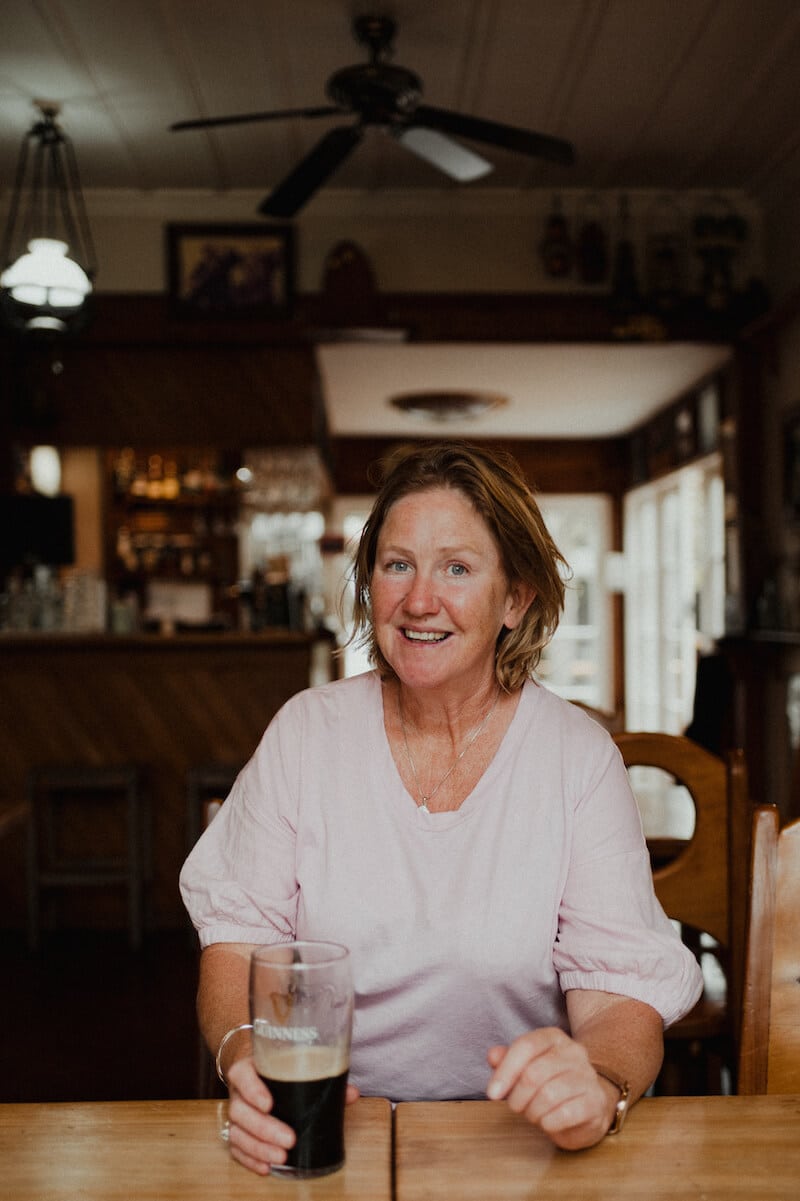
Another thing Orla is making a conscious effort to protect is the environment. As the landfill on Aotea has reached capacity and been closed, the residents have set themselves a zero-waste target. It’s never more obvious than when Orla’s liquor order for the festive season arrives at Shoal Bay on the ferry from Auckland. While her bottled drinks make up only one chest-high pallet, her keg order is enormous. “That’s all mine,” she says proudly, pointing down the quay at a mountain of metal cylinders. All up, her delivery totals one hundred and fifty kegs of beer. Remarkably, for a little pub, the Currach boasts ten tap beers, and Corona is the only beer Orla sells by the bottle. The reason for this? In the same way that living off-grid makes you extremely conscious of the amount of power you consume, living on an island makes you very aware about the amount of waste you produce. “I’m always looking to reduce rubbish,” she says.
The enormous order is stored in a shipping container, and it takes Orla and her staff an entire afternoon to collect and stow it. Come the evening, she’s back behind the bar, welcoming the locals and storm-stranded visitors with suggestions of wood-fired pizza or fish and chips. There’s a shortage of chefs on the island at the moment, meaning a limited menu for the time being, but Orla is putting together a killer kitchen team for the summer season.
Though she is a natural behind the bar and exudes the mother-hen aura of an old-school proprietress, when asked if she was raised in a similar environment or worked in pubs in her youth, she says, “No, never! I was a commercial underwriter for an insurance company in Dublin. I retired at thirty, took a redundancy package and travelled for a while. That’s when I met my previous husband, a Kiwi boat builder working in Bermuda.”
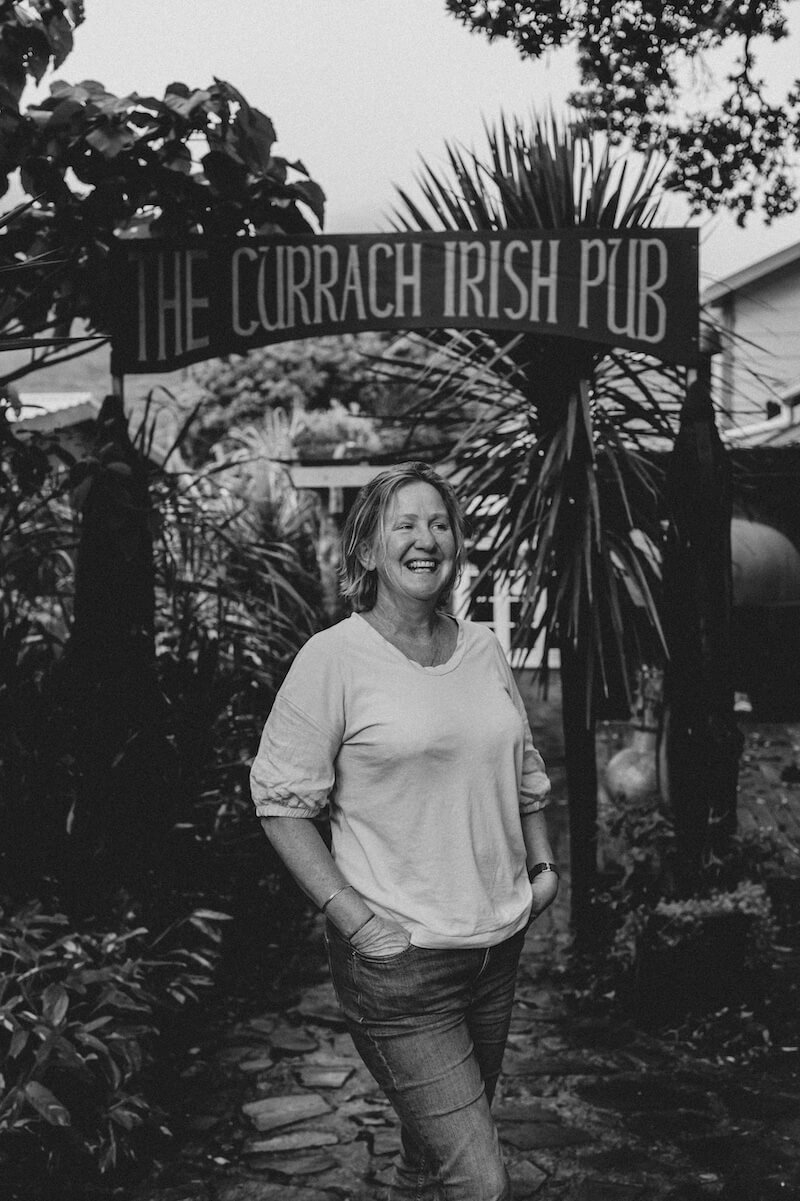

Orla’s ex-husband grew up holidaying on Great Barrier, and he brought Orla to the island in 2000. But the young couple soon moved back to Dublin where Orla went to university and studied auctioneering, valuation and land sales. She then set up a business in Dublin, but the global financial crisis – which severely maimed the so-called Celtic Tiger of Ireland’s economy – saw them return to Aotea in 2010 with a young family in tow. “We’d just started to have a family, and we thought it would be a great place for our children to grow up, which it has been. Every year, they go back to Ireland – Covid was the only time they didn’t. Their Irish culture is very important to me.”
“Whether we like it or not, tourism is the primary industry of the island,” Orla says. “The increase in tourism has been really good for the island and, like everything, a rising tide floats all boats.” And Orla has been in quite a number of proverbial boats during her time on Aotea. “I’ve done a myriad of different things, including a lot of property management,” she says. “I loved working at the pub. I couldn’t get over the fact that with three small kids, I would trot out at four o’clock in the evening, just as the mayhem time at home was starting, and come here twice a week and have adult conversations with people that I enjoyed; somebody would cook my dinner and hand me a glass of wine to have with it – and then, on top of that, I got paid!”
Perhaps it’s not surprising, then, that despite the unusually foul weather, the mountains of kegs to move and the fact that her head chef has just come back from a snowboarding trip on crutches, Orla comes across as a woman truly enjoying every aspect of her life.
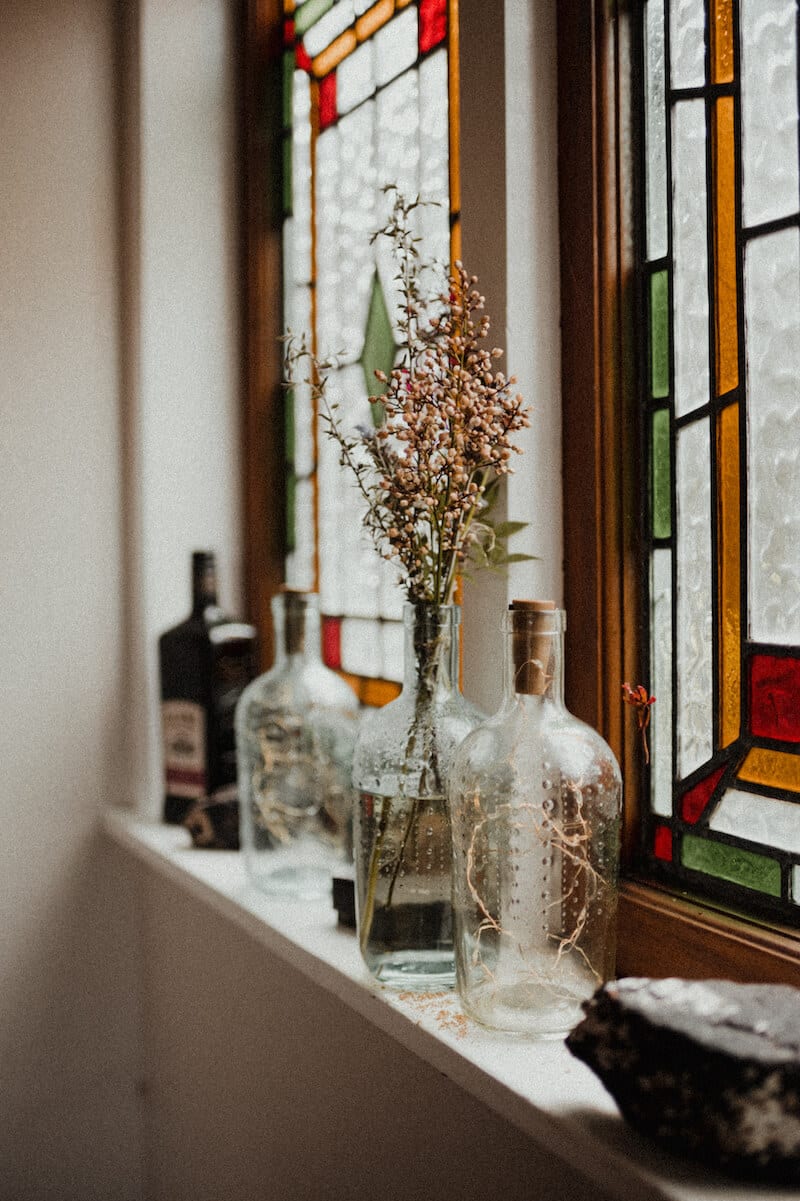
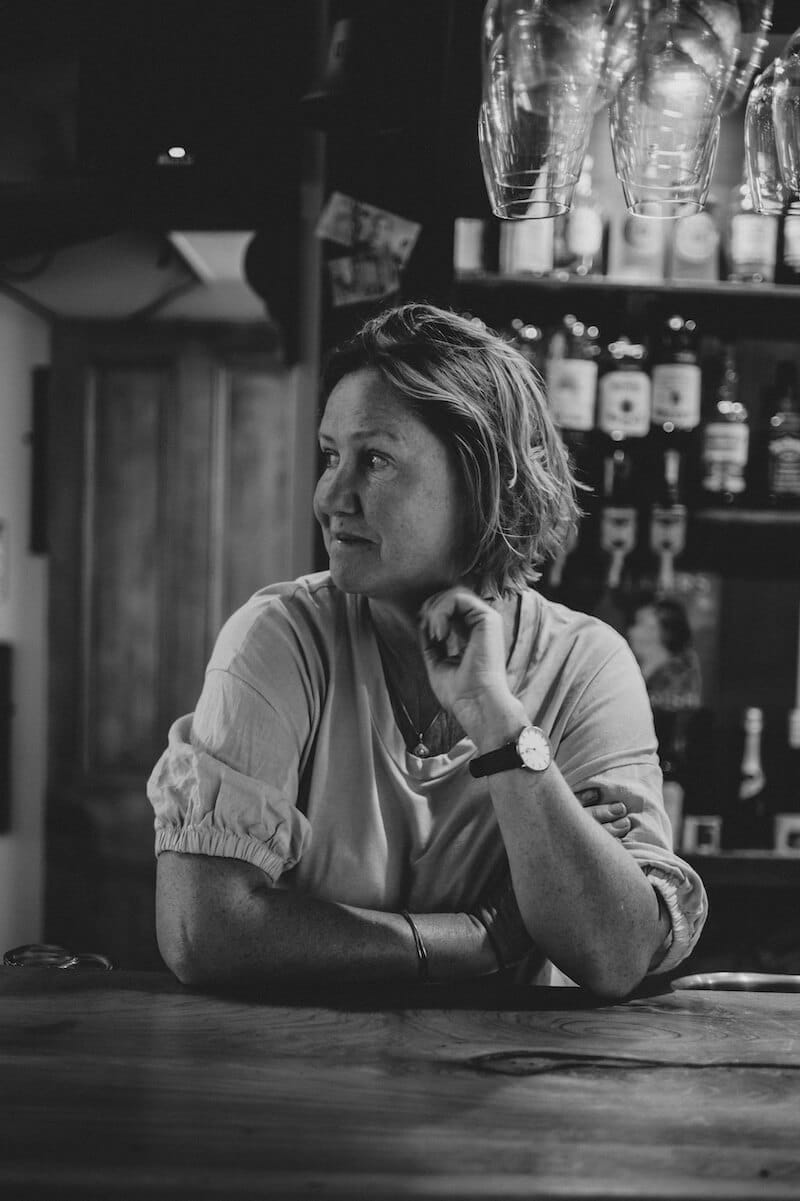
Felicitas Weisbach
A bright yellow kayak sits in the long grass on the homeward side of the floodwaters that cover Felicitas Weisbach’s driveway. “When the flooding gets worse than this,” she says, driving through the water in her 4x4, “my partner takes our son to school in the kayak.”
This is the reality of island life, something that Felicitas, 32, experienced to a lesser extent growing up on Waiheke Island. “My mum is German, the hippy type, so we grew up in a house that was always using natural, alternative remedies and things. There was a pretty cool community on Waiheke in the nineties. It was such a salt-of-the-earth, authentic group of humans – the real hippies, the real makers. It was a fun place to be, so alive.”
It is perhaps not surprising, then, that as an adult Felicitas has chosen an off-grid island lifestyle and set up a natural skincare business on Aotea Great Barrier. Her partner Luke, a teacher, has roots on the island, and in 2016 the couple moved to Kaitoke to set up a home and have a baby. But despite her own island upbringing, there have been some challenges that Felicitas has had to work through.
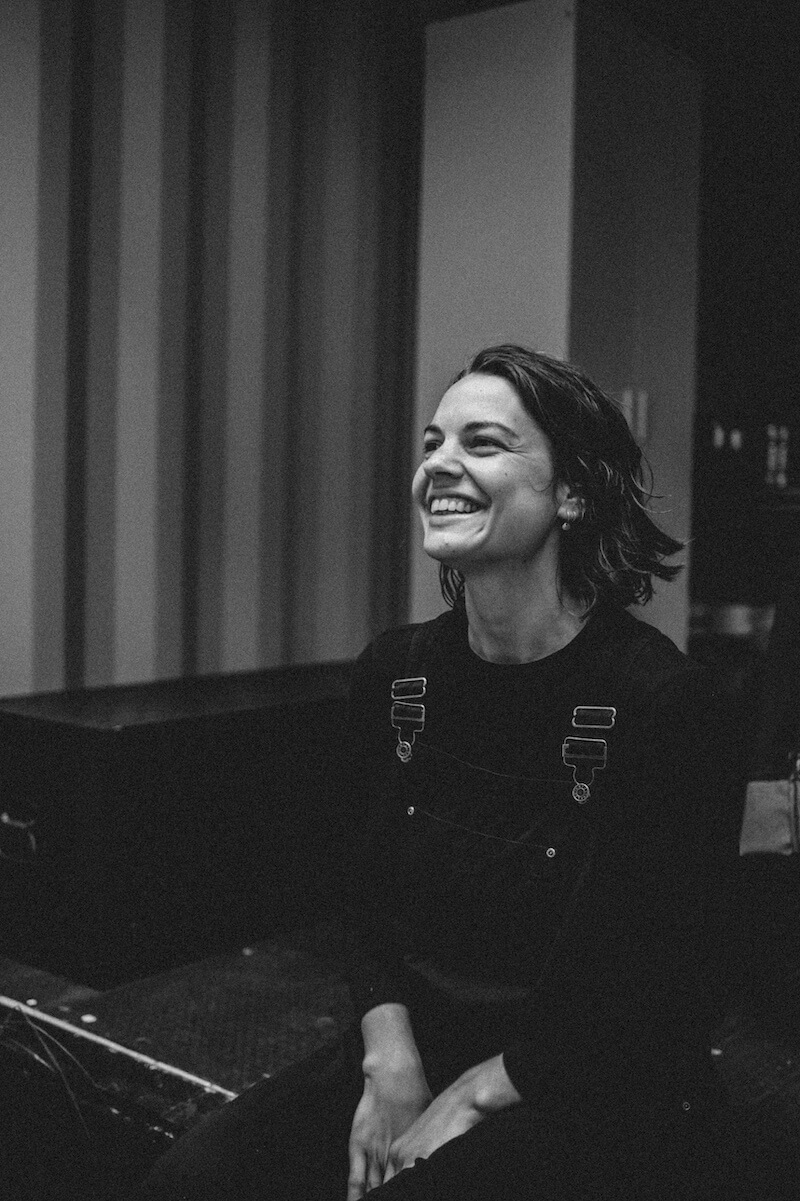
“We moved here when I was six months pregnant with Atlas. It’s a bit of a makeshift house. We started out with no power, no water, no refrigerator. We had a chilly bin, we had fairy lights, we were filling up bottles of water from other people’s houses. And then we had Atlas in that state. It was by choice, and it was fun. And then it was really hard.”
When the isolation and the hardship of living in a shack with a newborn got too much, Felicitas began to experiment with making natural skincare. “It grew out of needing to find something to keep me sane,” she says. “I had pretty severe post-natal depression and anxiety and I just started playing with herbs, flowers and oils and making products for myself as a sort of escapism. Eventually I got brave enough to try to sell it, and it sold really well. So I kept creating and it just kept growing.”
Kaitoke Wilds was one of the first Aotea skincare brands to really gain traction off-island, though several others have found national markets since Felicitas began to mix her own concoctions. Even today, the company is pretty grassroots – and certainly living up to its name.
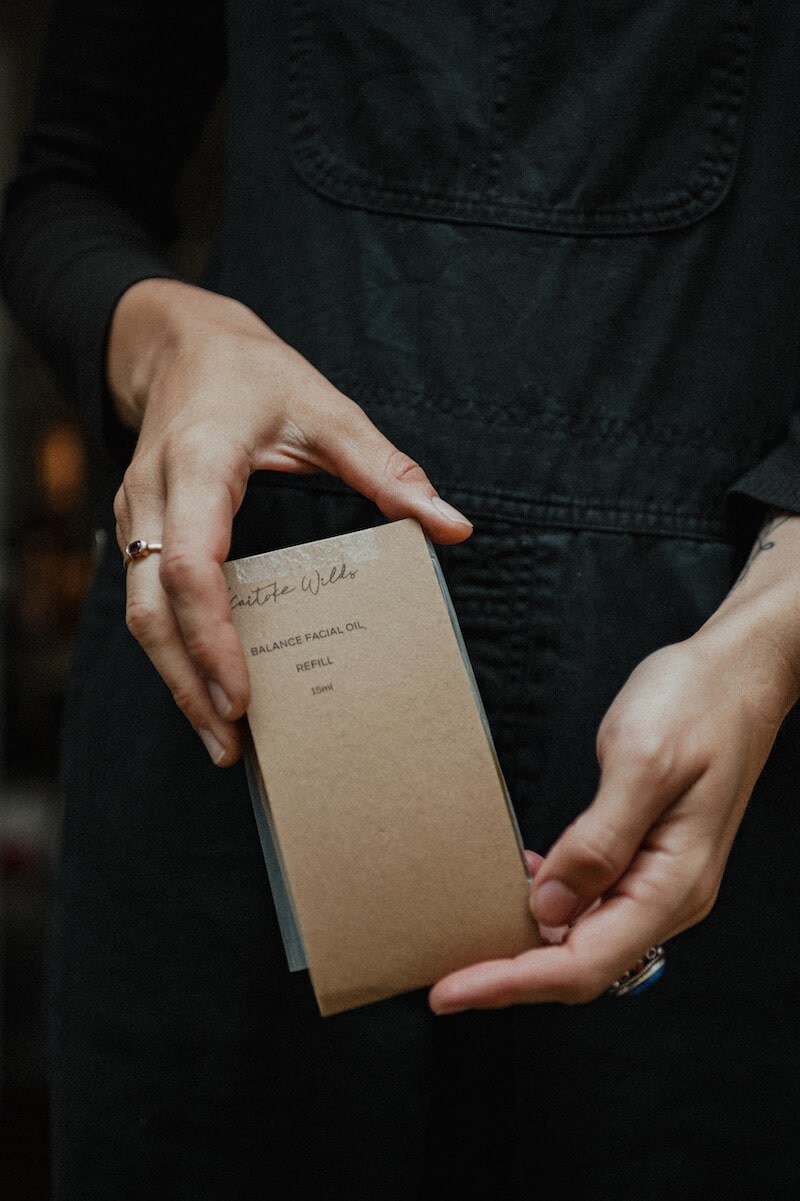

In a black shipping container in the bush, Felicitas has set up a workshop that is not only off-grid, but totally unplugged. There is no power of any sort in the studio at Kaitoke Wilds. “We’ve got solar at the house,” she says, gesturing further up the waterlogged drive, “and a generator, for times like this when we’ve had days of rain.” But to let light into the studio, she opens up the double doors at the loading end of the container, and the dark room comes to life.
At one end of the studio is a small desk with books on herb lore and medicinal plants. At the other end are shelves of glass jars containing the dried herbs and flowers of Felicitas’s trade, along with a box of what appears to be white chocolate buttons. A secret stash of confectionary to get her through those tough days? “That’s coco butter,” she laughs. Okay, so things haven’t got that bad, though she says this past winter she lost a lot of her dried ingredients to damp and mould.
Initially, Felicitas started out trying to grow the ingredients herself, but soon found that gardening on that scale was a full-time job and left her no time to prepare and ship her products. “When it gets busy, you don’t have time to grow anything. I started using herbs from herb suppliers but they just weren’t that vibrant compared to what I dried from my own garden. I thought the next best thing would be what other people have grown, so I went on this big hunt to find New Zealand-grown ingredients, any plant matter that was New Zealand grown, and then I would see what I could use it for.”
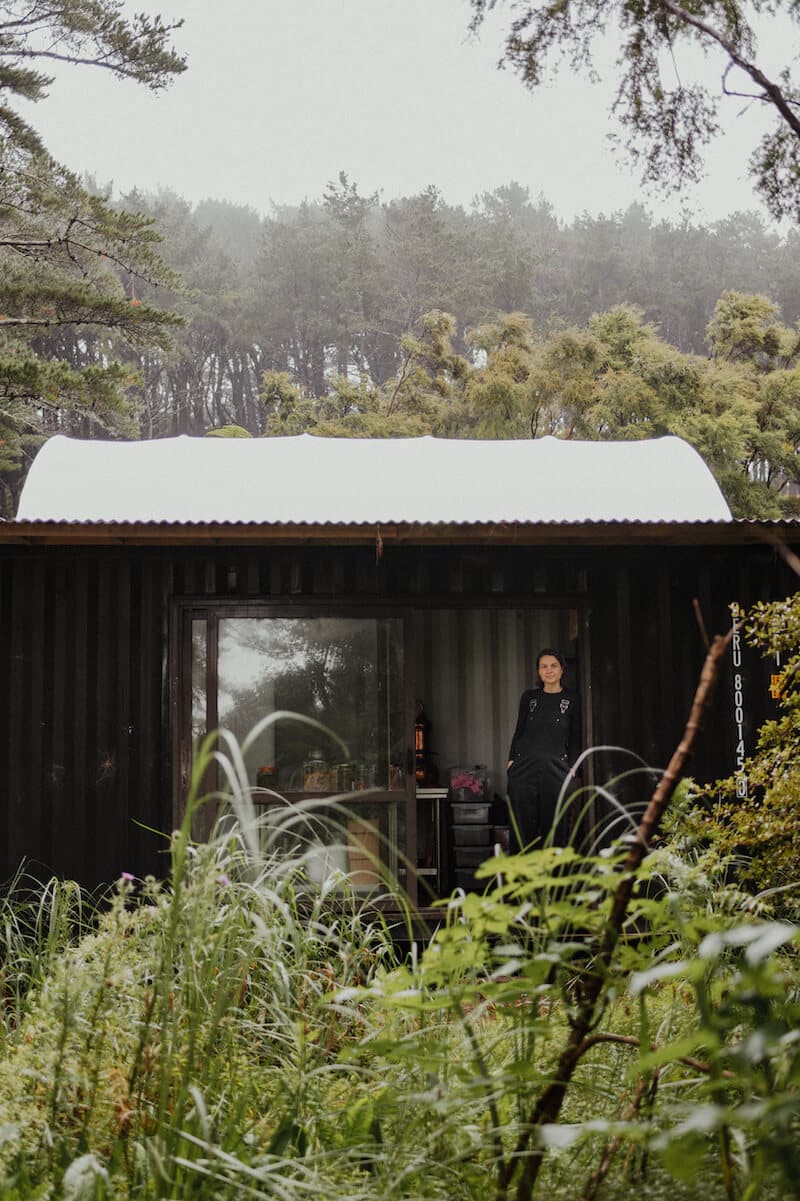
In a new evolution of the term, Felicitas became a forager. “I think of it as foraging – you’re not out there in the wild foraging, but it’s modern foraging. What are people growing? You’ve got your staples like calendula and chamomile; and I found saffron and horopito – not just native plants but anything that is thriving across Aotearoa.”
Thus was born the Forager’s Collection, a range of skincare products made from flora foraged digitally from across the country. Felicitas’s approach is to find what’s flourishing, and then put it to good use, rather than go out seeking something in particular with an application already in mind. “I’m foraging for things that are growing well and then I take that back to the studio and find what it works well with, synergistically. It brings me so much joy to find a way to use them.”
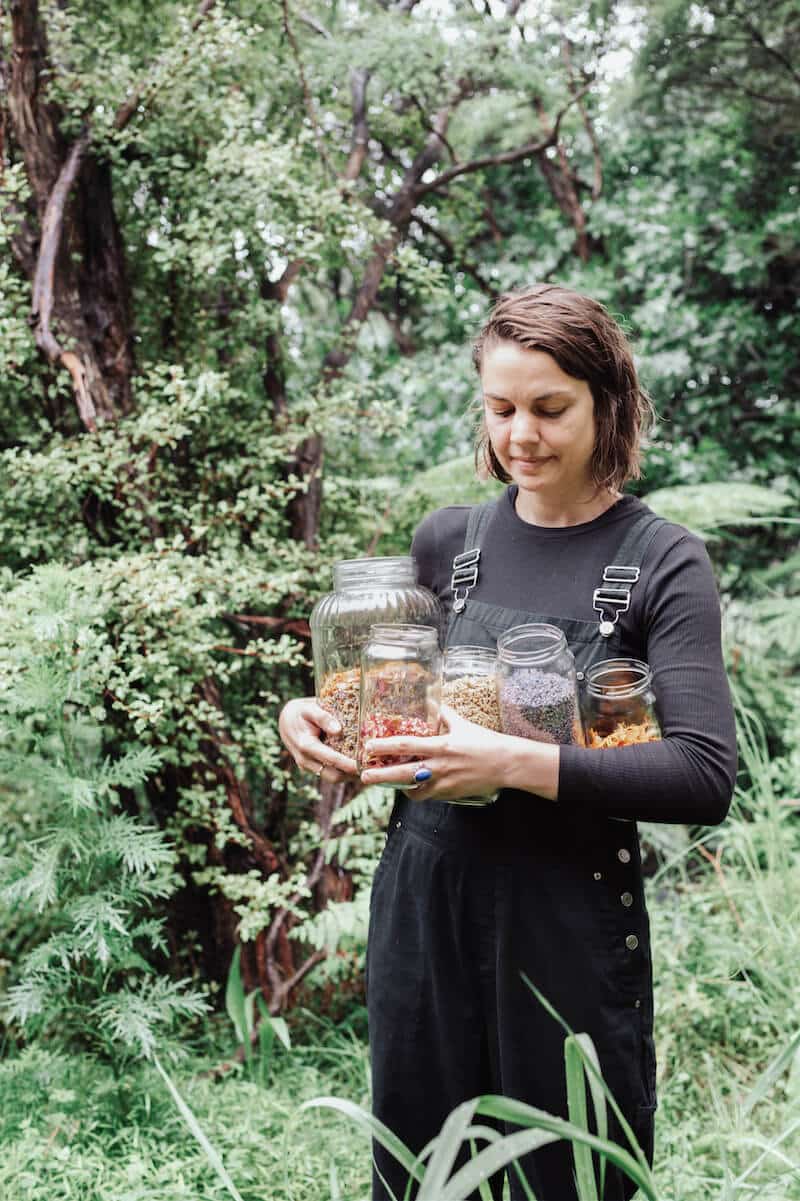
Felicitas admits that there are good weeks and bad weeks on the island. She talks about missing her social circle in Auckland and the life she left behind. But when the sun is shining and the gardens are bourgeoning, life on Aotea is vibrant and stimulating. There are markets on the island and Felicitas has found them to be fantastic for sales and networking. So much so that she’s no longer using social media to promote her business.
Despite a background in social media marketing, after moving to the island and starting Kaitoke Wilds, Felicitas found the darker side of social media to be damaging. “In the last year I’ve dropped off social media because I realised the comparison game wasn’t doing my mental health any good. And just how much of my life it was taking up. I noticed the drop in business when I stopped, but then it picked up again. I get orders pop up in my inbox from all over the country – and internationally, too. It’s really wonderful to see the impact my products seem to have.”
Now Kaitoke Wilds is promoted by word of mouth. “When I sell at markets, people buy products and then they’ll reorder from the website.” But markets at the moment are an on-island-only affair. “I’ve never made it to a market off-island,” Felicitas admits. “I’ve talked about it a lot. But to pull off a market off-island, I’d have to spend a lot of money on freight to get my products off-island. That’s a gamble for a one-off event. But I do have stockists on Waiheke and in Timaru and Wellington.”
While the challenge of establishing and maintaining a business in an unplugged container in the bush on a remote island is certainly a notable point of difference that sets Kaitoke Wilds apart from other skincare brands, Felicitas’s island-inspired attitude to waste and sustainability is a far more significant aspect of her company.
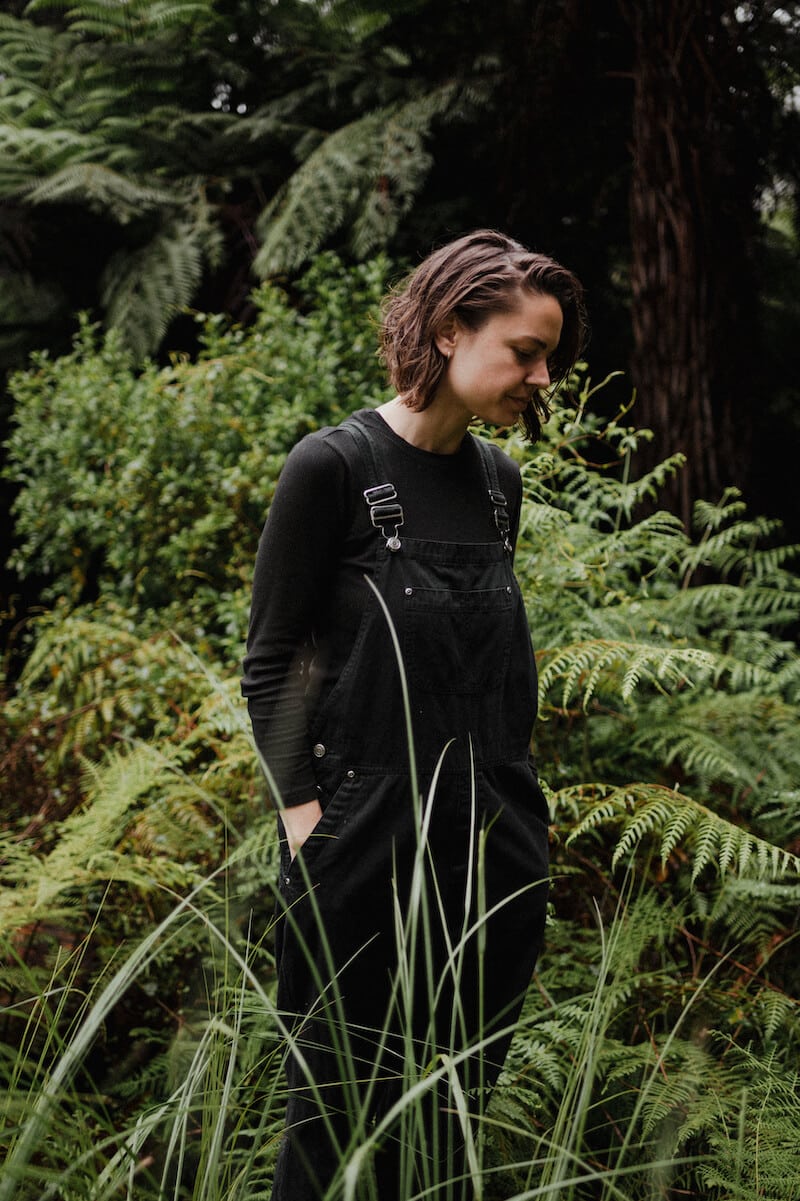
“Living over here, you’re faced with your waste. We don’t have a landfill anymore, so all the waste that we create, we have to get rid of ourselves. It really makes you think, do I actually need the things that I purchase, and, as a maker, do I really need to have all of this packaging for my product?” Felicitas has first-hand experience of facing the island’s waste. Alongside running her business and raising her son, this industrious woman works at the island’s recycling centre. “Soon I will be taking on an ecology role as well and helping out with minimising construction and demolition waste.”
This awareness flows over into her business in various ways. To reduce the number of glass dropper bottles she sells, she has started using reusable refill pouches, inspired by squeezy yoghurt pouches, that are completely compostable and New Zealand made. “The vacuum sealer only runs on sunny days,” Felicitas laughs. “And sometimes I have leakages. It’s not perfect, but that’s the thing when you’re trialling new ideas.”
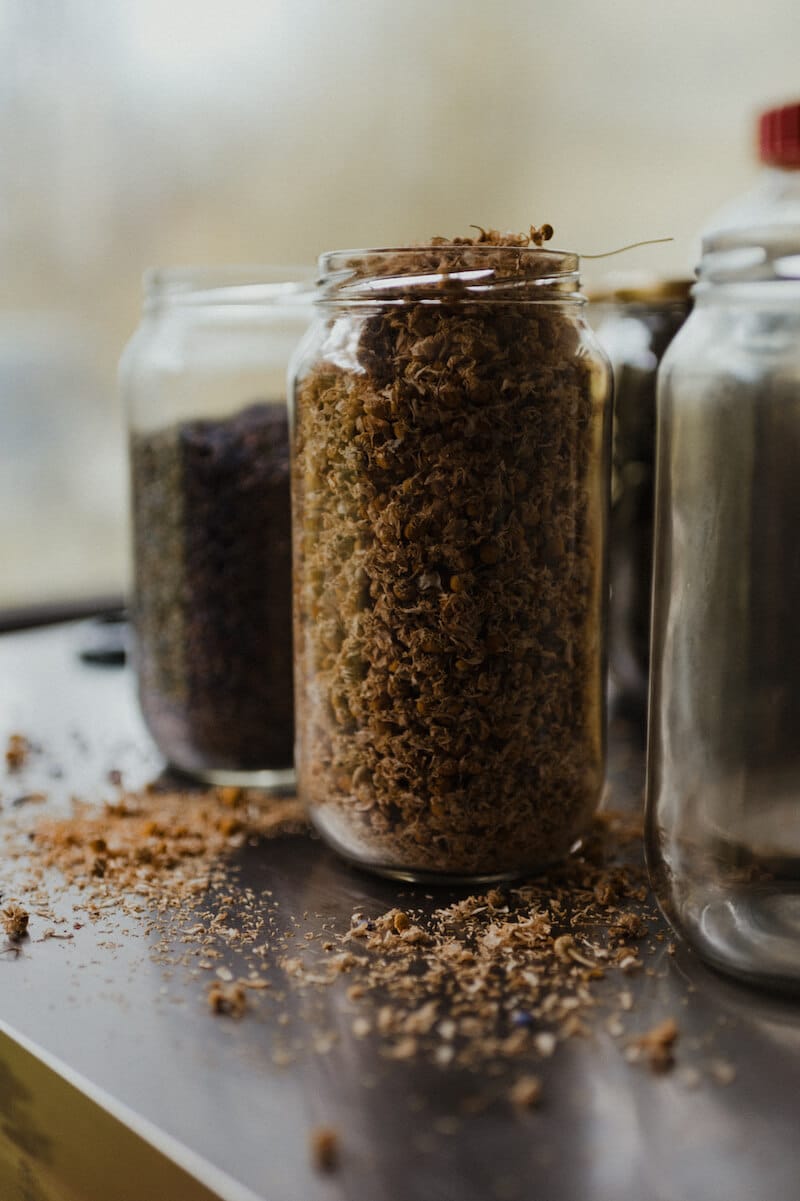
Another new and novel thing about Felicitas’s business is the education aspect of what she’s looking to achieve. “The direction I’d like to head in now is teaching people to do what I do. I want to help people to realise that they don’t need a twenty-step skincare routine. They can use only a few products, and they can use what grows in New Zealand. There’s so much potential for buying and using locally grown ingredients. It’s not my knowledge, I don’t own it. It’s everyone’s knowledge. You can’t afford skincare? Get some honey, the cheapest honey you can, and use that to wash your face twice a day. That’s the most basic thing you can do and it’s amazing, my favourite cleanser. You can even leave it on as a face mask. It’s nature’s gift. There are so many snippets of knowledge like this that I would love to share with anyone who’s keen to learn
Now that business is thriving – even without social media marketing – Felicitas is looking at getting back into the garden to grow her own herbs and flowers. “I want to do it the other way around now. I want to focus more on the garden. There’s so much plant knowledge that I feel we’ve lost. Instead of companies saying, ‘I take ownership of this knowledge, I’m not going to share with you how I made this’ – well, actually it’s really easy. And it’s our right. Please use it. Let’s use what’s growing in abundance, let’s use what we’ve got around us to look after ourselves.”
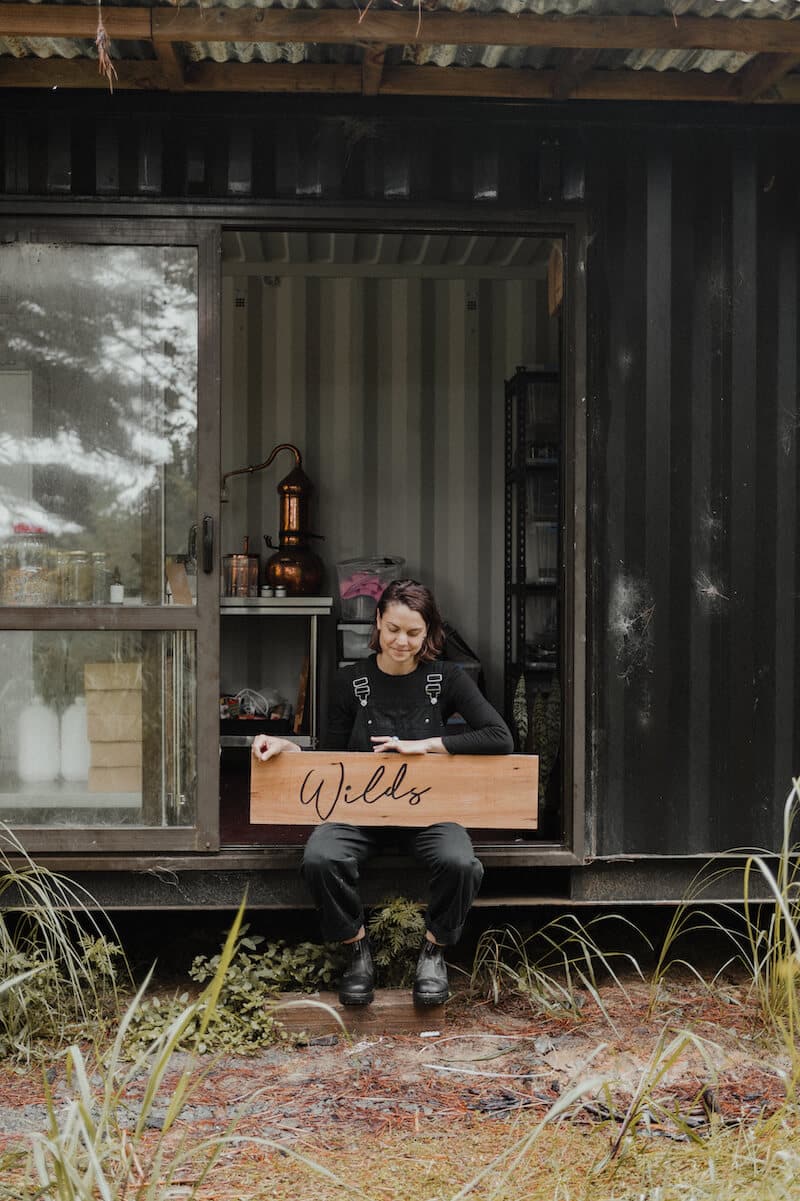
Andi Ross
Ten days before Christmas, Andi Ross of Island Gin on Aotea Great Barrier posted a photo on her Instagram account – a rain-lashed window opening onto a bleak coastal scene heavy with cloud. The image was accompanied by the text: “Last orders today by 5pm – to get our gin orders off in time for Christmas and New Year, we need to ship them now.” In an embodiment of its name, a cloak of white cloud had settled over Aotea, preventing flights (and Christmas gin orders) from taking off.
While this weather, which had been wreaking havoc on the island for some weeks, was unexpected at this time of year, being prepared for such events is part of island life. Andi herself was marooned here by lockdowns back in 2020, but she took it in her stride and made lemonade from lemons, as the saying goes. Well, actually, she made something a fair bit stronger.
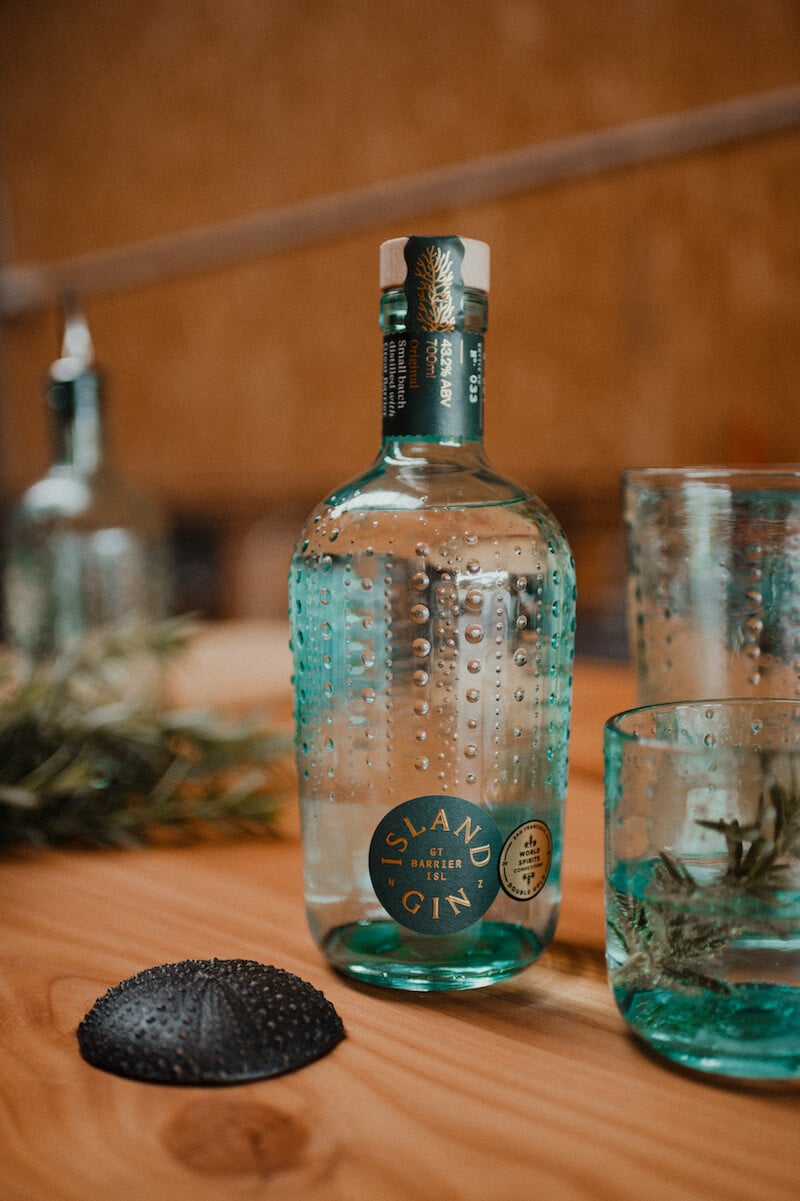
Originally from Australia, Andi, 56, arrived in New Zealand with her husband and two daughters twenty years ago. “We’d come from Singapore. Jase, my husband, was working in Auckland. I saw this little ad one day in the paper – bach for sale, Great Barrier Island. I didn’t know what a bach was, didn’t know where Great Barrier was, so I jumped on the plane and flew over. I was like, ‘Oh my god, this is it!’” Despite not knowing anything about the island, Andi knew she had found the place she wanted to call home, and they spent the following years visiting whenever they could.
Now that their two daughters are adults, Andi and Jase have made Medlands Beach their permanent home, and Andi has made gin her livelihood. “I’d been in advertising for a long time and I wanted to get out of that,” she explains. “I love gin and I love the island, and I thought, ‘I wonder what could possibly be done here?’ I started working on gin in an alembic copper pot still on a 12 volt system – I had it all rigged up with wires and stuff to keep it boiling. I thought ‘It’s got to have honey in it, mānuka honey from the island.’ I wanted it to have as much local flavour as possible.”
The locals of the small island community were the first to get behind Andi and her gin. “Tiddles at The Rocks bottle store in Claris put it in the store. When it sold out, I thought, ‘Okay, now I can confidently give it a go.’ Someone said to me, ‘We wouldn’t be drinking it if it wasn’t any good.’ That’s when I started working on the bottle design.”
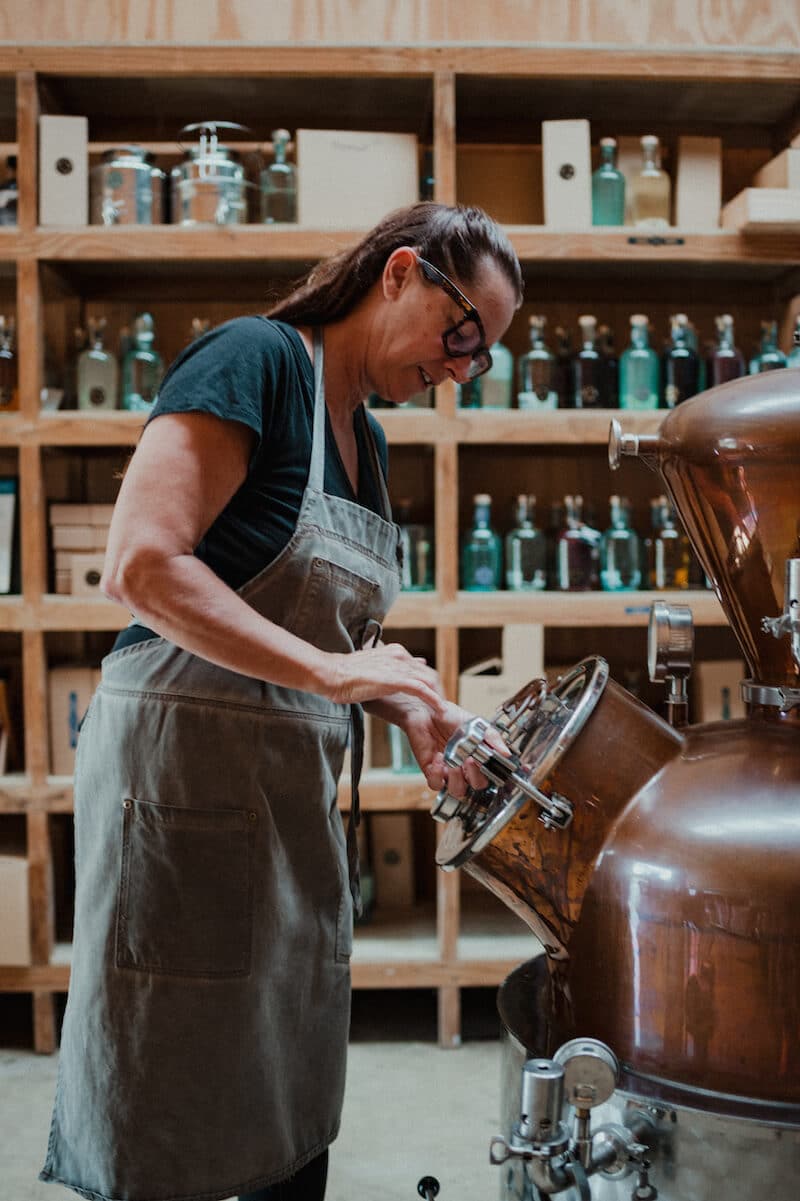
Andi’s bottles are all over the island. They are flower vases in people’s homes, water carafes in cafes and restaurants, olive oil and vinegar dispensers in private kitchens. Textured like a kina shell, there’s no confusing them with the bottles of other spirits. “They are made in Auckland,” Andi explains. “I designed them with a friend of mine. You find kina here on the beach, and we were looking at it thinking, ‘How do we make it a really high-end bottle rather than a hokey craft project?’ We just worked on the dot structure until we got it perfect.”
Not only are her bottles unique and exquisitely crafted, she’s also making sure they can be reused. In a waste-conscious move, true to the island way of thinking, used Island Gin bottles are upcycled into tumblers and mixing jugs. This was inspired by a local glass blower, and makes yet another application for the stunning glassware.
It took Andi three years to get her bottles designed and across the line. Island Gin officially launched in November 2019, and then Covid hit. “Strangely,” Andi admits, “it helped the business. I was still allowed to distil, and everyone was shopping online.”
Island Gin is a one-woman operation, which meant lockdowns didn’t interrupt her distilling. Jase helps her out with the bottling, but apart from that, at this stage, the distillery is a space she shares only with Frank – the 220 litre copper still she has named after her grandfather. Andi says, “I would like to employ a few people on the island, that would be the ultimate.” But at this stage, it’s just her and Frank.
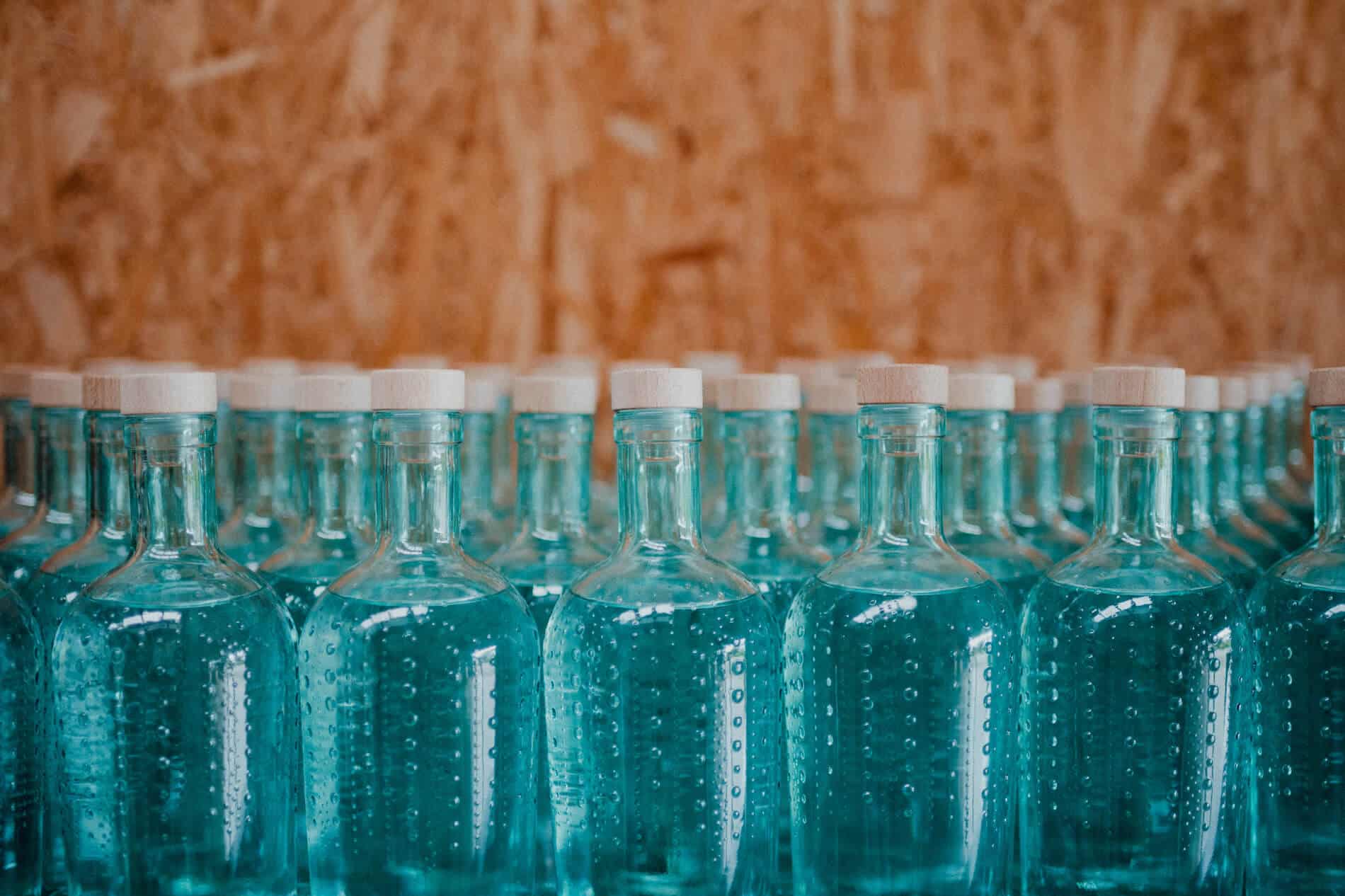
The island location has inspired Andi, but it has also thrown some obstacles in her way. “There is that degree of difficulty, being five hours by barge from the mainland. I’ve got to get my bottles across, I’ve got to get them back off. I had a big order for Christmas, then found out the boat wasn’t going. I can put them on the plane if they’ve got space – but then it didn’t fly yesterday. The boat was coming, so we changed it all around, put the order on the pallet, put it on the back of the ute, drove down to Tryphena and got it on the boat.” That’s the reality of such a location. “It’s logistics actually, it’s not just the weather.”
But the weather is a big part of the production of Island Gin, and soon it will be even more so. Frank is currently a generator-powered still. “I run on eleven kilowatts, which is a huge system,” Andi admits. “Because we like to recycle everything on the island, I used to have the old generator from the Stonewall Store in Tryphena. It was huge, like an old Mac truck. But it got to the stage where it just wouldn’t kick over, and I’m out there in the rain going, ‘Please start. Please start.’ Then one day I was in here distilling, and everything just shut off. I ran outside and it was smoking. We tried everything, but it couldn’t be fixed so I just had to take the hit and get a new genie.”
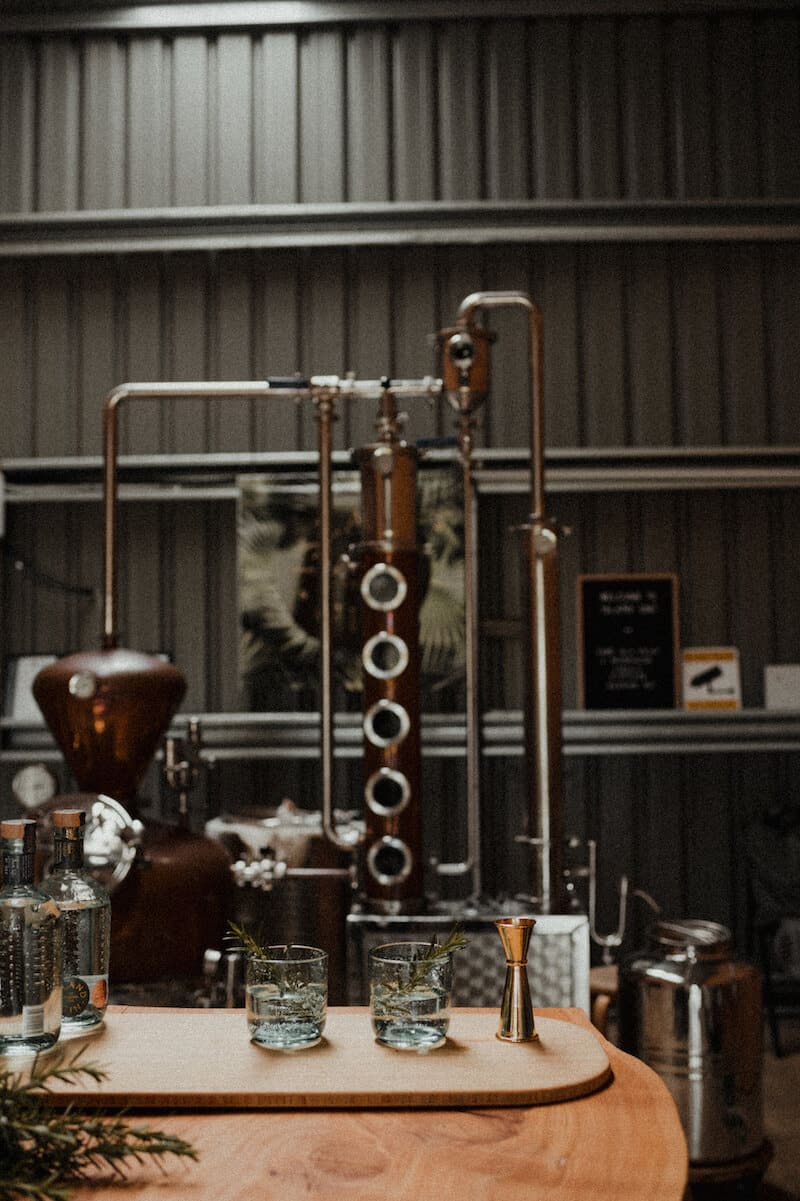
There are, however, plans in place to have the business running purely on solar very soon. “I rent these sheds from my landlord, and he’s about to put in solar,” Andi says. “There will be enough power to run the still.”
Andi isn’t sure, but she thinks she might be the only distiller in New Zealand to be solar powered. “Most people will have access to mains power, which is a lot easier. It’s so much more efficient. But the solar thing will be great. I have been trying to get a grant to get solar, but they like to do huge solar farms now and I’m sort of in that in-between stage – I’m not quite big enough to do a huge thing, but it does take a lot of panels to run this.”
Will solar power mean that Andi can grow her business? And does she even want to? “I would like to grow,” she says. “But we’re not chasing the whole on-premises thing, cos other people do that in volume. We’re more direct-to-consumer and bespoke wine and spirits places. We’ve had a bit of interest in Japan – they also love the kina and they appreciate high-end products – and we’re looking into the States, but in a really controlled manner. It’s early days, really.”
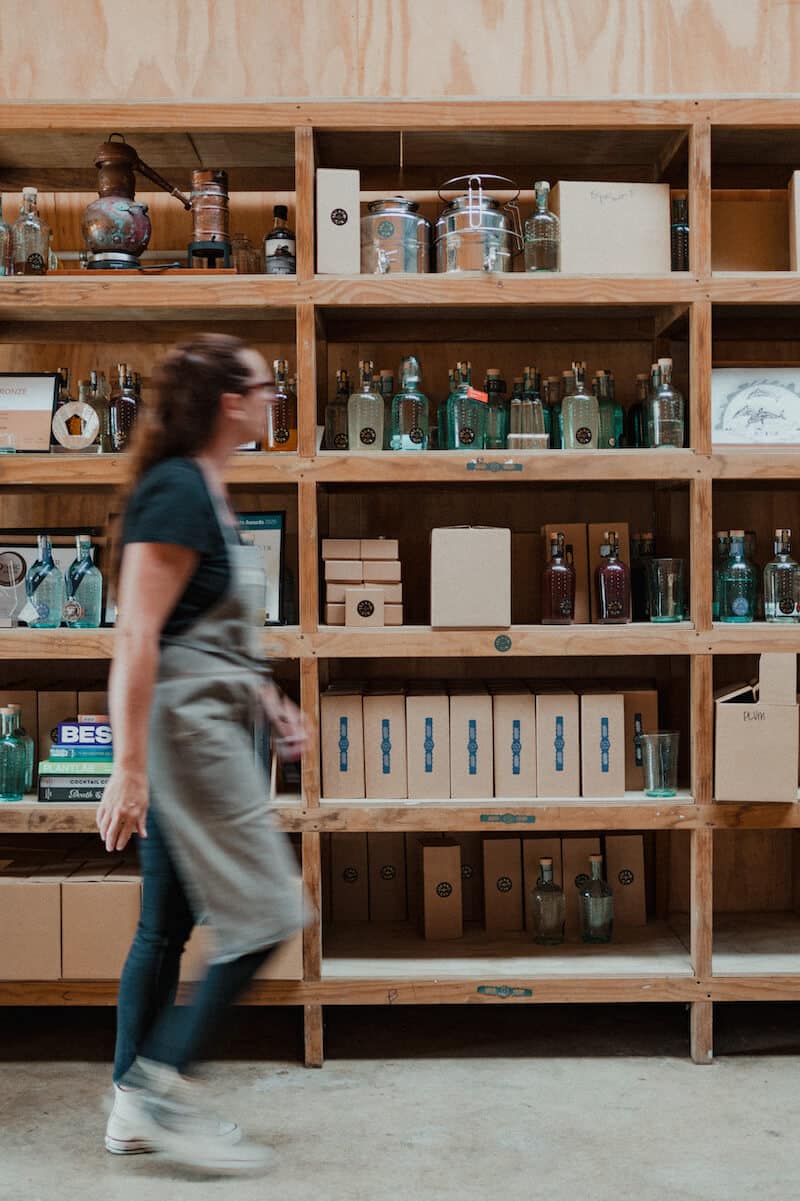
Andi’s love of cocktail mixology and the magic of fruits and botanicals has led her to create some weird and wonderful things. Alongside her Original Manuka Honey gin and fifty-seven per cent proof Navy Strength gin, she has an interesting array of flavoured gins including chocolate-, plum-, peach- and tangelo-infused limited runs. “They’re all experiments,” she laughs. Her latest is called Experiment L, a lime-gin concoction that has been sweetened to almost resemble limoncello. “It’s thirty per cent lime, from Okiwi Passion up north [on the island],” she says. “I like experimenting, and I want to use the produce on the island. I think it’s really important to swim in your own lane, then you don’t get influenced by anything else. Just do your own thing.”
While running a distillery on Great Barrier Island may have its trying times, the community on the island have made Andi one of their own. “There’s only eleven hundred people here, and everyone is so vastly different in what they’ve done in their history. But anything that happens on the island, the whole community is behind you. I think it’s always been like that, and I don’t think it will ever change.”
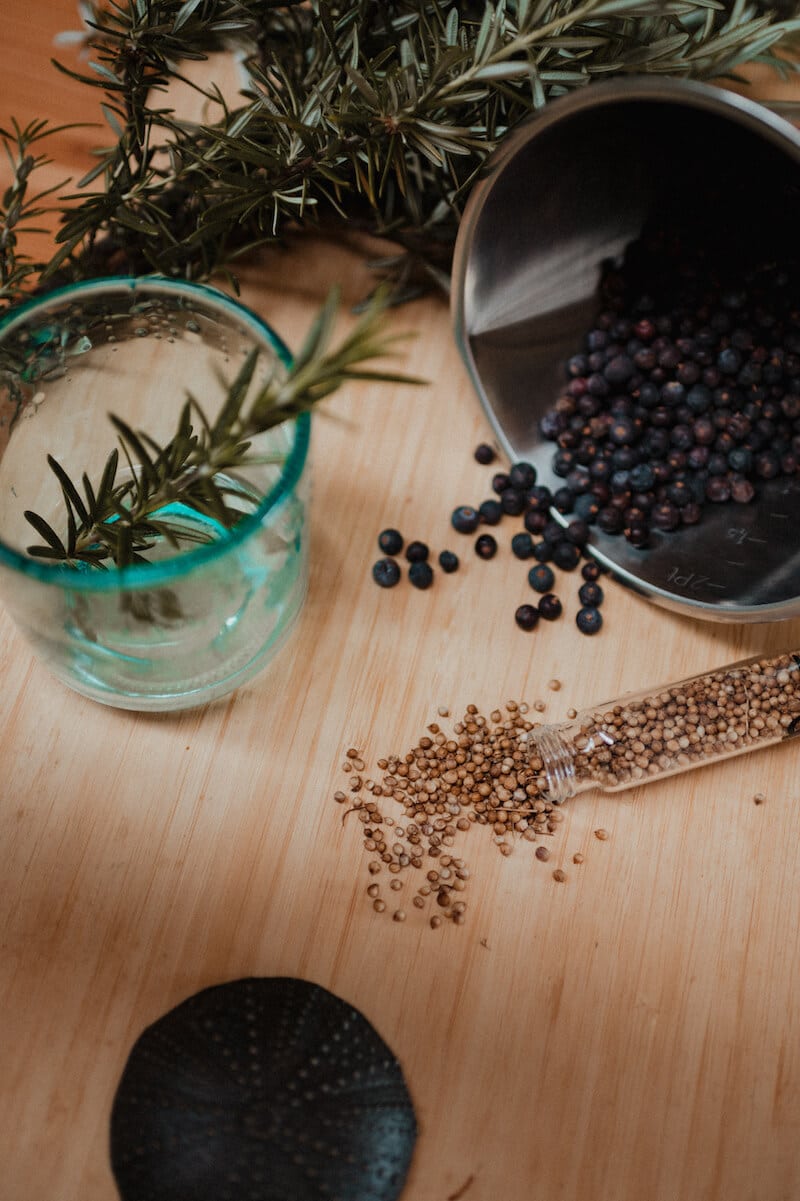
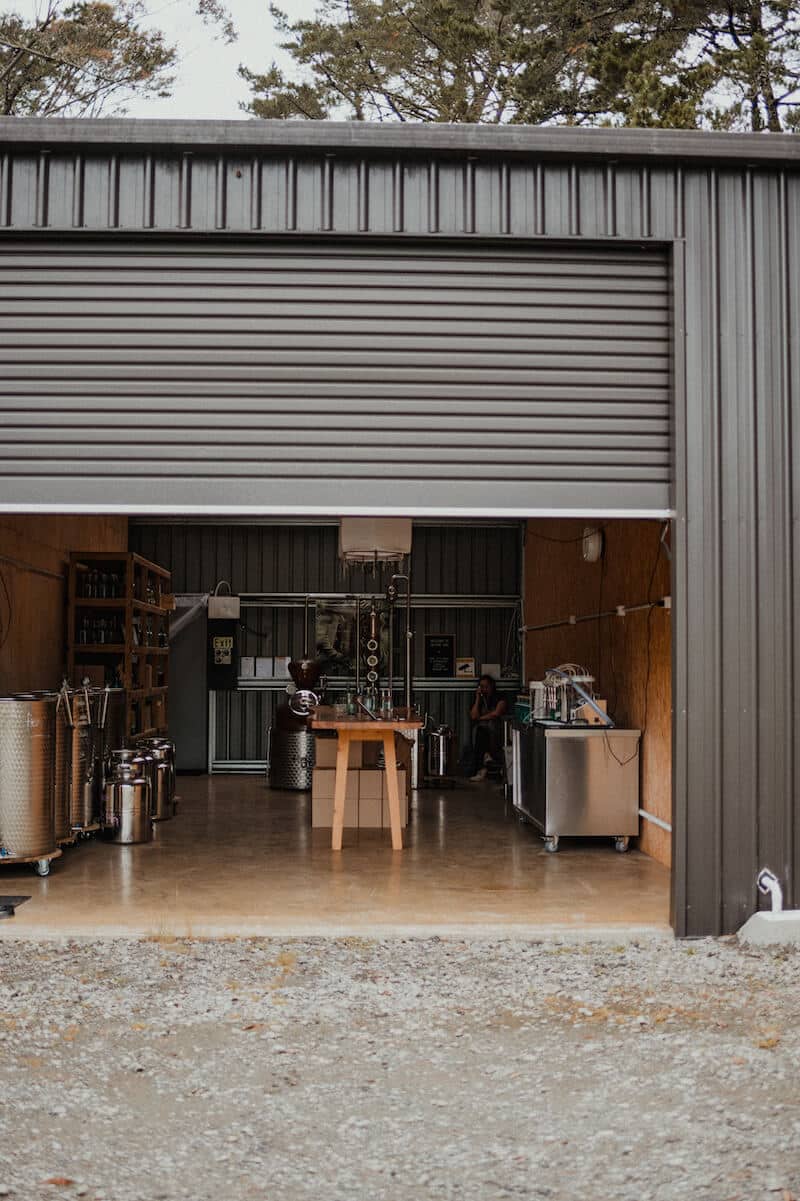

This story is part of THREAD, a year-long project by Shepherdess made possible thanks to the Public Interest Journalism Fund through NZ On Air.
If you enjoyed this story, please share with someone else.
Get your hands on a copy of Shepherdess.
